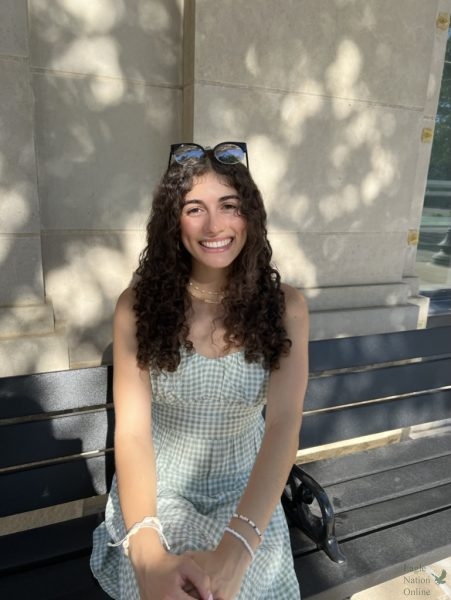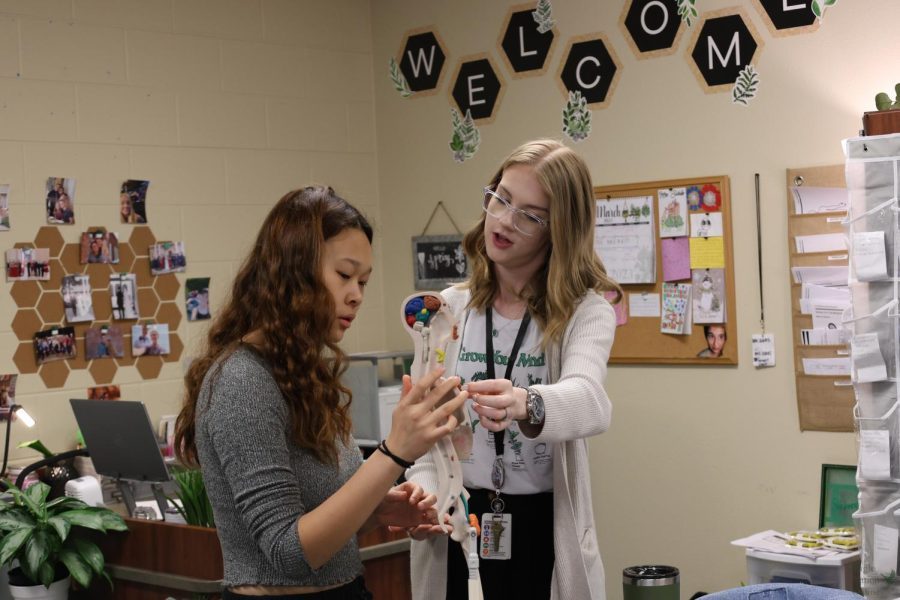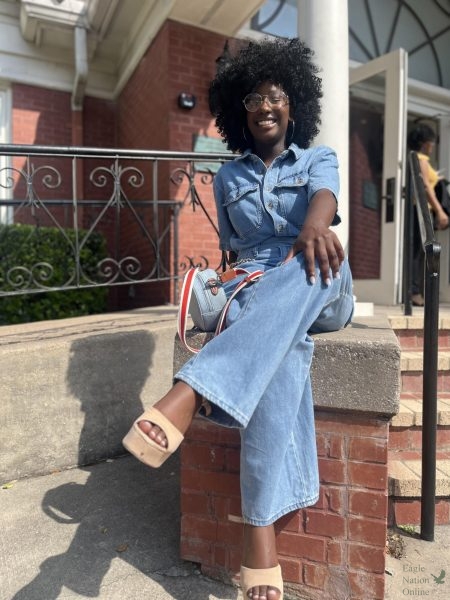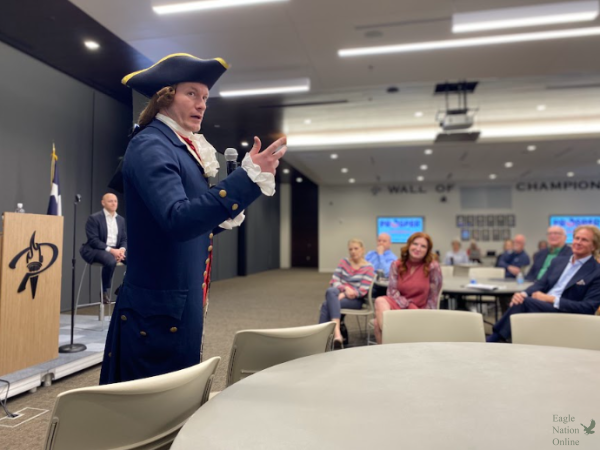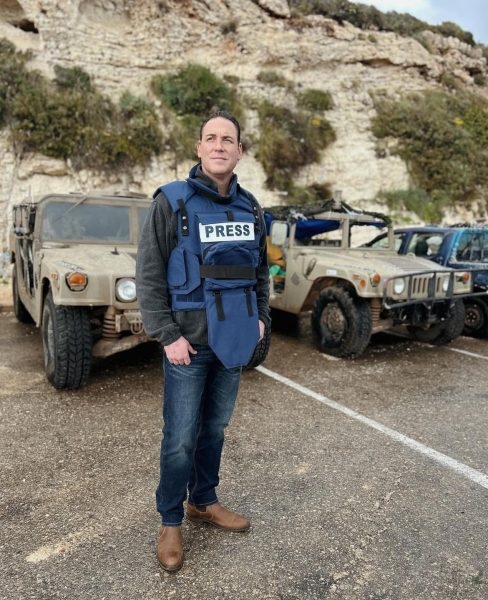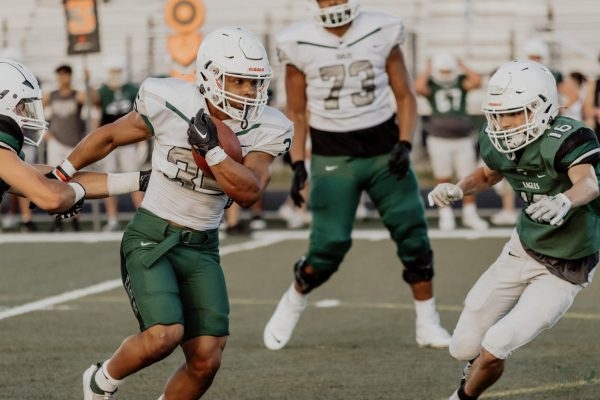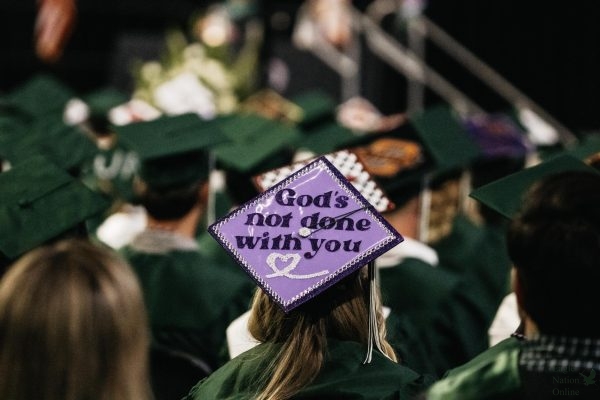CTE teacher helps students explore human body systems, find clues to prevent crime
Caitlyn Sickels prepares students to pursue career in medical field, forensics
Reaching out to touch the model of the human body, Caitlin Sickels explains to her student, Kaylee Song, where to put a model of an organ in the body. “It’s really cool to get to see people grow,” Sickels said. “It’s cool to see the different backgrounds that everybody comes from and what their interests are.”
The bell rang, and as she starts walking around the classroom, assisting her students and answering questions, Caitlyn Sickels models for her students how to find a passion in anatomical sciences and crime investigations.
Sickels teaches human body systems, medical interventions and forensic science. This year marks her first to teach at Prosper. She attended PHS as a student and graduated in 2017. After that, she went to Texas A&M and graduated in 2021.
While Sickels stayed home from college when the COVID-19 pandemic hit, she decided that she wanted to pursue teaching when she realized that she had a gift for helping her siblings with their homework.
“They didn’t know how to do anything,” Sickels said. “The teachers weren’t really able to answer their questions for them, so I would help them with their work a lot. Anytime that they went from that ‘confused, I don’t know what I’m doing’ to (when a) light went on in their eyes, and they were like, ‘yeah, I know. Okay, this makes sense’ that would be really rewarding for me.”
This realization sparked an interest for her to pursue a career in teaching.
“I was kind of like, oh, teaching might be something I’ll do, but I didn’t really think I was going to do it right away,” Sickels said. “Then, so many teachers quit during COVID because it was awful. And, so I knew that there was a shortage. After I got married, I was like, that would be a good career to have a family, and also, the kids need teachers right now.”
Before she became a teacher, Sickels worked and taught in a biomedical science lab. Now, she is pursuing her certification through an alternative program.
“I was working with laboratory mice and genetic stuff,” Sickels said. “I was a research assistant helping PhD students with their research. I kind of just helped them do all that work.”
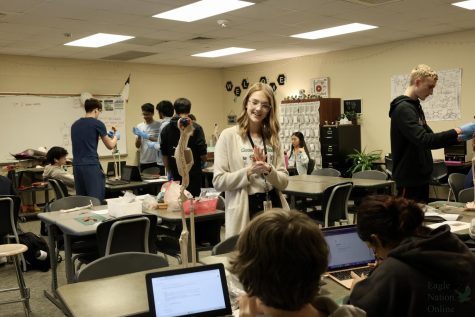
According to Sickels, not all was easy when it came to deciding to become a teacher.
“I always respected my teachers growing up, and I thought (they were) super cool,” Sickels said. “Of course, I had favorite teachers, but I didn’t really think that was my path. I wanted to be in the criminal justice forensics realm for a really long time. I never thought I would be smart enough to teach other people things, and so I was kind of intimidated by the career.”
Her interest in forensics started in this school district.
“I actually took forensics here at Prosper High School with Amy Viars and loved it, which is part of the reason why I went and got my degree in it,” Sickles said. “I just grew up watching all the crime shows and just found them so fascinating. I teach medical interventions and human body systems partially because of the research assistant background that I have, so that made me qualified to teach those ones.”
Teaching allows her to make connections and build relationships with her students.
“It’s really cool to get to see people grow,” Sickels said. “It’s cool to see the different backgrounds that everybody comes from and kind of like what their interests are and just make relationships with people, especially teenagers, which tend to be like the most neglected group.”
Sickels has her students start off the day doing a bell ringer, or warm-up assignment. For her Medical Interventions class and Human Body systems class, the students learn mostly on their own, and she helps them when they need it. For her Forensics class, she gives them a lecture and then provides them instructions to start working on the activity she assigns.
“I’m really big about going around and getting to help each individual group with stuff,” Sickels said. “Creating those relationships by having just conversations like ‘what did you do this weekend’ or ‘what you’re going to do this weekend’ and those kinds of things, too. So that’s what normally it looks like.”
She even makes connections with students outside of her classroom. Anu Ganesh comes into Sickels’ room every other day to study.
“She is very welcoming and patient,” Ganesh said. “I don’t even have Mrs. Sickels as a teacher, but I’m glad I’ve gotten to know her.”
Sickels has lived in many different places. She was born in Arizona and also lived in Alaska for almost five years. She also lived in Las Vegas, Fort Worth, back to Arizona, and then she moved here in 2014 as a student at PHS. She sees a difference in coming to PHS as a student versus a teacher.
“I was always so intimidated to be in school because there was so many kids, and it’s huge,” Sickels said. “As a teacher, I spend way too much time here, so I’ve gotten used to it. It was definitely weird that first few days though, for sure.”
Sickels said she hopes to make forensics more fun and interesting for students. While the forensics roles already contains full classes, her goal is to expand it and the “Project Lead The Way,” PLTW program, along with the Medical Interventions and Human Body systems program, as it is fairly new.
“They knew of the subject, but they’re not really super passionate or interested in it,” Sickels said. ” I’m trying to figure out ways to make it more interesting for anyone in the class, not just people who are interested in forensics going into it.”
Sickels is the sponsor for the Cancer Awareness Club.
“I love how Mrs. Sickles is always so nice to her students, and how passionate she is toward the subjects she teaches.”
— Kaylee Song
“(In) medical interventions, we have a whole unit over cancer,” Sickels said. “It kind of helps get information from that class that I can share with the kids in Cancer Awareness club, and then also having the opportunity to maybe half the people in the club, show some interest in it and then take those classes so they work well with each other. You can learn a little bit more about the new developing methods that they’re doing to try to cure cancer, so it’s cool.”
Kaylee Song, the president of the Cancer Awareness Club, said she met Sickels last year, when she was in training.
“I love how Mrs. Sickles is always so nice to her students, and how passionate she is toward the subjects she teaches,” Song said. “I like how I can talk to Mrs. Sickles about some of the problems I faced, either about school or personal life. I always enjoy taking her class.”
Song said Sickels inspires her to be productive in school.
“She tries her best,” Song said, “and puts a lot of effort into making sure her students get and understand the knowledge.”
Sickels said she appreciates the community here at Prosper as well as other teachers who have helped her as a first-year teacher.
“The teachers are amazing, and they help each other, especially (from the point of view of) a first-year teacher,” Sickels said. “They really make sure they nurture those first-year teachers so that we stay, and they do a really good job of making sure we have the resources necessary for us to (teach) the best we can.”
Your donation will support the student journalists of Prosper High School. Your contribution will allow us to purchase equipment and cover our annual website hosting costs.
